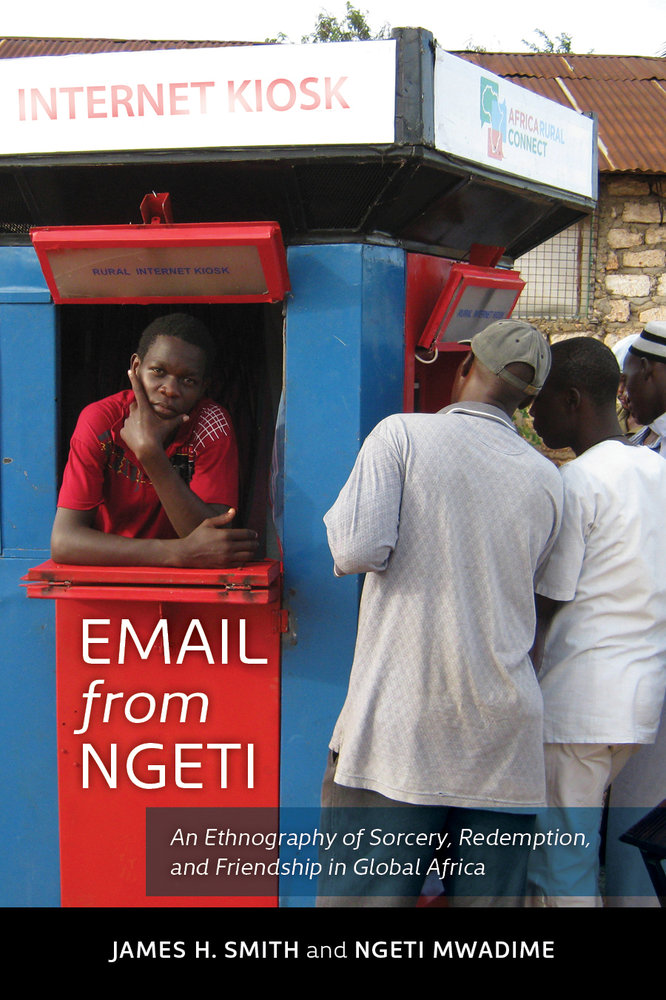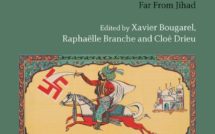
Colonialism and Postcoloniality in Africa: Encounters and Dilemmas
This is part of our Campus Spotlight on Brandeis University.
This class uses an anthropological lens to explore the cross-cultural encounters, clashes, dilemmas, and representations of colonialism and post-coloniality in sub-Saharan Africa. The focal point will be British colonialism, but there will be some comparative discussion of other colonialisms, particularly French and Afrikaner. Topics include: colonial racism and the “civilizing mission”; missionary encounters as cultural encounters; African experiences of colonial medicine and colonial psychiatry; miscegenation and European anxiety about the so-called “black peril”; colonial psychologies; colonial ideologies surrounding “animal cruelty,” dress, and servants; the impact of “Indirect Rule”; African nationalism and resistance movements (special case study: the Mau Mau rebellion in Kenya); the post-colonial politics of land alienation (special case study: Zimbabwe); African memories of colonialism; whites in Africa today; and contemporary dilemmas surrounding modernities, globalization, and development.
The learning objectives of this course dovetail with two concerns central to contemporary anthropology: cross-cultural encounters/misunderstandings, and the ways in which power asymmetries are enacted, experienced, resisted, and represented in such encounters. Through an anthropological approach to colonialism in sub-Saharan Africa, we explore radically different cultural assumptions (European and African) regarding matters ranging from religion, health, property ownership, gender, the body, and even love. Also in an anthropological vein, we will examine how colonial inequality was grounded in meaning-making, including racial and racist ideologies and colonial misunderstandings of the sociocultural arrangements they encountered in Africa. We will learn about different modes of resistance, ranging from political organization to subtler weapons of the weak. We will also examine the crises of conscience and defensive maneuvers among elite groups (colonial Europeans and contemporary white Africans) confronted by resistance and critique. And, examining some themes of post-coloniality in Africa, we probe about the family resemblance between colonial upheavals and contemporary agendas (“modernization,” “development”), as well as the complex, ambivalent, and diverse ways in which Africans have responded to these changes. Along the way, students will explore the anthropological theme of how macro-level political arrangements ripple into the minutiae of daily experience and meaning-making, and vice-versa. Your own participation, including leading class discussions, will be crucial to this class. (Note: this course is cross-listed in Anthropology and AAAS. It also counts toward Brandeis’ Non-Western and Comparative Studies requirement.)
READING LIST
INTRODUCTION: COURSE THEMES, PRE-COLONIAL AFRICA, COLONIAL RACISM
· SKIM: Parker, John and Richard Rathbone. 2007. Ch. 1, “The Idea of Africa,” and Ch. 5, “Colonialism in Africa,” in African History: A Very Short Introduction. Oxford University Press. Pp. 1-24, 91-113.
· (To read in class) Wilson, Christopher. 1952. Excerpts from Before the Dawn in Kenya. Nairobi: The English Press, Ltd.
WEEK 1
IMPERIAL REPRESENTATIONS
· Comaroff, Jean and John L. Comaroff. 1991. “Africa Observed: Discourses of the Colonial Imagination,” in Of Revelation and Revolution: Christianity, Colonialism, and Consciousness in South Africa, Vol. I. University of Chicago Press. p. 86-125.
· McClintock, Anne. 1995. Excerpt from “The Lay of the Land: Genealogies of Imperialism” in Imperial Leather: Race, Gender, and Sexuality in the Colonial Contest. Routledge. Pp. 21-56.
Youtube videos:
“The Victorian View of Non-Europeans” http://www.youtube.com/watch?v=XvnAwxLYFyI
“Colonialism: Sins of Europe in the Scramble for Africa” http://www.youtube.com/watch?v=uu6-TLC0NRQ
WEEK 2
MISSIONARY ENCOUNTERS AS CULTURAL ENCOUNTERS
· Price, Richard. 2008. “The Making of Missionary Culture,” and “Cultural Encounters: The Destabilization of Missionary Culture,” in Making Empire: Colonial Encounters and the Creation of Imperial Rule in Nineteenth Century Africa. Cambridge University Press. Pp. 16-38, 57-92.
· Comaroff, John L. and Jean Comaroff. 1997. Ch. 2, “Preachers and Prophets: The Domestication of the Sacred Word,” and (SUPPLEMENTARY) Ch. 3, “Cultivation, Colonialism, and Christianity,” in Of Revelation and Revolution: The Dialectics of Modernity on a South African Frontier, Vol. 2. University of Chicago Press. p. 63-165.
WEEK 3
POLLUTION, PATHOLOGY, and DANGER: COLONIAL MEDICINE AND COLONIAL PSYCHIATRY
Missionary Medicine
· Vaughan, Megan. 1991. “The Great Dispensary in the Sky: Mission Medicine,” in Curing their Ills: Colonial Power and African Illness. Stanford University Press. Pp. 55-76.
· Comaroff, John L. and Jean Comaroff. 1997. “The Medicine of God’s Word,” in Of Revelation and Revolution: The Dialectics of Modernity on a South African Frontier, Vol. 2. University of Chicago Press. pp. 323-364
African Experiences of Colonial Medicine, (Colonial Psychiatry):
· White, Luise. 2000. “‘Bandages on Your Mouth’: The Experience of Colonial Medicine in East and Central Africa,” in Speaking with Vampires: Rumor and History in Colonial Africa. University of California Press. Pp. 89-121.
· (SUPPLEMENTARY: Vaughan, Megan. 1991. “The Madman and the Medicine Man: Colonial Psychiatry and the Theory of Deculturation,” in Curing their Ills: Colonial Power and African Illness. Stanford University Press. Pp.100-128.)
WEEK 4
COLONIAL MENTALITIES
· Dinesen, Isak. 1992[1937]. Chapters 1 and 2 (half of 3 is available as a SUPPLEMENT), Out of Africa. Random House.
· Thiong’o, Ngugi Wa. 1997. “Detained: A Prison Writer’s Diary,” in Perspectives on Africa: A Reader in Culture, History, and Representation, Roy Richard Grinker and Christopher Burghard Steiner, eds.. Oxford: Blackwell Publishing. Pp. 613-623.
· Shadle, Brett. 2012. “Cruelty and Empathy, Animals and Race in Colonial Kenya.” Journal of Social History 45: 1097-1116.
· Memmi, Albert. 1991[1965]. “The colonizer who refuses,” “The colonizer who accepts,” in The Colonizer and the Colonized. Beacon Press. pp. 19-76.
· (SUPPLEMENTARY: Comaroff, John L. and Jean Comaroff. 1997. “Fashioning the Colonial Subject: The Empire’s Old Clothes,” in Of Revelation and Revolution: The Dialectics of Modernity on a South African Frontier, Vol. 2. University of Chicago Press. pp. 218-276)
WEEK 5
RACE, SEGREGATION, GENDER, and BODY POLITICS
· Kennedy, Dane. 1987. “Black Perils” and “Racial Boundaries” in Islands of White: Settler Society and Culture in Kenya and Southern Rhodesia, 1890-1939. Duke University Press. Pp. 128-166.
· Hansen, Karen Tranberg. “Body Politics: Sexuality, Gender, and Domestic Service in Zambia.” in Perspectives on Africa: A Reader in Culture, History, and Representation. Roy Richard Grinker and Christopher B. Steiner. New York: Blackwell. Pp. 550-564.
· Conklin, Alice. 1998. “Redefining ‘Frenchness’: Citizenship, Race Regeneration, and Imperial Motherhood in France and West Africa, 1914-1940” in Domesticating the Empire: Race Gender, and Family Life in French and Dutch Colonialism, Eds. Julia Clancy-Smith and Frances Gouda. Charlottesville, University Press of Virginia. Pp. 65-83.
· (SUPPLEMENTARY: Thomas, Lynn. 1998. “Imperial Concerns and ‘Women’s Affairs’: State Efforts to Regulate Cliterodectomy and Eradicate Abortion in Meru, Kenya, c.1910-1950,” Journal of African History 39(1))
WEEK 6
MODES OF AFRICAN AGENCY: INDIRECT RULE, AFRICAN NATIONALISM, AND SOCIAL TRANSFORMATIONS
· Geschiere, Peter. 1993. “Chiefs and Colonial Rule in Cameroon: Inventing Chieftaincy, French and British Style,” Africa 63(2):
· Rodney, Walter. 1997. “How Europe Underdeveloped Africa,” excerpted in Roy Richard Grinker and Christopher B. Steiner, eds. Perspectives on Africa: A Reader in Culture, History, and Representation. Pp. 585-596.
· Fanon, Frantz. 2004[1963]. Excerpts from The Wretched of the Earth. Grove Press. 35-55, 249-51, 289-310.
· (SUPPLEMENTARY: Osbourn, Emily L. 2003. “‘Circle of Iron’: African Colonial Employees and the Interpretation of Colonial Rule in French West Africa”, Journal of African History 44(1): 29-50)
· (SUPPLEMENTARY) Parker, John and Richard Rathbone. 2007. “Imagining the Future, Rebuilding the Past,” in African History: A Very Short Introduction. Oxford University Press. Pp. 114-134.
WEEK 7
LOYALISM, RESISTANCE, NATIONALISM: A CASE STUDY in MAU MAU
· Anderson, David. 2005. “’Parasites in Paradise: Race, Violence, and Mau Mau.” Histories of the Hanged: The Dirty War in Kenya and the End of Empire. New York: W. W. Norton and Company.
· John Lonsdale, 1990. “Mau Maus of the Mind: Making Mau Mau and Remaking Kenya,” Journal of African History, 31(3): 393-421
· (SUPPLEMENTARY: Berman, Bruce. 1997. “Nationalism, Ethnicity, and Modernity: The Paradox of Mau Mau”, in Roy Richard Grinker and Christopher B. Steiner, eds. Perspectives on Africa: A Reader in Culture, History, and Representation. Pp. 653-670.)
· (SUPPLEMENTARY: Anderson, David. 2005. “Spoils of War: Decolonizing Kenya, Memorializing Mau Mau.” Histories of the Hanged: The Dirty War in Kenya and the End of Empire. New York: W. W. Norton and Company.)
Students will review and “show and tell” recent news coverage in Kenya and the UK concerning the June 2013 ruling in London’s High Court that Mau Mau Veterans deserve monetary compensation and an apology.
VIDEOS:
News clips of the time at: http://www.youtube.com/watch?v=19GvIXNDOIk
John Nottingham, colonial official who broke away: http://www.youtube.com/watch?v=P4RpUyWRkyA
WEEK 8
THE POLITICS OF REPRESENTATION: LAND REFORM IN ZIMBABWE
In class: Watch the feature-length film “Mugabe and the White African” (youtube link is in latte with the readings). I recommend you do the below readings first for context if possible. I’m assigning this video—which was heralded in the West but tells only one side of a complicated story—so that we can discuss the politics of representing land reform.
Readings:
· First 5 pages of “Fast Track Land Reform in Zimbabwe.” 2002. Human Rights Watch 14 No. 1. (You’re welcome to skim further as well, if you’re interested in more detail.)
· Hanlon, Joseph, Jeannette Manjengwa, and Theresa Smart. 2012. Chapter 1, “Veterans and Land,” in Zimbabwe Takes Back Its Land. Kumarian Press.
· Polgreen, Lydia. 2012. “In Zimbabwe Land Takeover, A Golden Lining.” New York Times.
· Scoones, Ian, Nelson Marongwe, Blasio Mavedzenge, Jacob Mahenehene, Felix Murimbarimba, Chrispen Sukume. 2010. Chapter 1, “Livelihoods and Land Reform in Zimbabwe.” Zimbabwe’s Land Reform: Myths and Realities. James Currey.
WEEK 9
(Other) WHITES IN AFRICA TODAY
Truth and Reconciliation in South Africa
· Vice, Samantha. 2010. “How do I live in this strange place?” Journal of Social Philosophy. 41(3): 323-342.
· Harding, Jeremy. 1999. “Picking up the Pieces.” New York Times, May 30th, 1999. http://www.nytimes.com/books/99/05/30/reviews/990530.30hardint.html
(Please read the review article. The article includes a link to the first chapter of Antjie Krog’s “Country of my Skull,” which is purely SUPPLEMENTARY.)
Guilt, Denial, Identity in Kenya
· McIntosh, Janet. 2016. Excerpts from Unsettled: Denial and Belonging among White Kenyans. University of California Press.
WEEK 10
POSTCOLONIAL/POST-INDEPENDENCE DILEMMAS
Family Structures, Love, Domesticity, Globalization
· Mutongi, Kenda. 2007. Excerpts from Worries of the Heart: Widows, Family, and Community in Kenya. University of Chicago Press.
· Hunter, Mark. 2009. “Providing Love: Sex and Exchange in Twentieth-Century South Africa,” in Love in Africa, eds. Jennifer Cole and Lynn M. Thomas. University of Chicago Press. Pp. 134-156.
· Ferguson, James. 1999. “Expectations of Domesticity: Men, Women, and the ‘Modern Family’,” in Expectations of Modernity: Myths and Meanings of Urban Life on the Zambian Copperbelt. University of California Press. Pp. 166-206.
· (SUPPLEMENTARY: Spronk, Rachel. 2009. “Media and the Therapeutic Ethos of Romantic Love in Middle-Class Nairobi,” in Love in Africa, eds. Jennifer Cole and Lynn M. Thomas. University of Chicago Press. Pp. 180-203.)
WEEK 11
POSTCOLONIAL/POST-INDEPENDENCE DILEMMAS continued
Witchcraft, Modernity, Uncertainty
· Ashforth, Adam. 2001.“On living in a world with witches: everyday epistemology and spiritual insecurity in a modern African city (Soweto),” in Henrietta Moore and Todd Sanders (eds.) Magical Interpretations, Material Realities: Modernity, Witchcraft and the Occult in Postcolonial Africa. London: Routledge.
· McIntosh, Janet. 2010. “Mobile Phones and Mipoho’s Prophecy: The Powers and Dangers of Flying Language.” American Ethnologist 37(2): 337-353.
· Smith, James H. and Ngeti Mwadime. 2014. Excerpts from Email from Ngeti: An Ethnography of Sorcery, Redemption, and Friendship in Global Africa. Oakland, California: University of California Press.
· (SUPPLEMENTARY: Nyamnjoh, Francis B. 2001. “Delusions of development and the enrichment of witchcraft discourses in Cameroon,” in Henrietta Moore and Todd Sanders (eds.) Magical Interpretations, Material Realities: Modernity, Witchcraft and the Occult in Postcolonial Africa. London: Routledge.)
WEEK 12
POSTCOLONIAL/POST-INDEPENDENCE DILEMMAS continued
· Ferguson, James. 2006. “Globalizing Africa? Observations from an Inconvenient Continent,” and “Chrysalis: the life and Death of the African Renaissance in a Zambian Internet Magazine.” In Global Shadows: Africa in the Neoliberal World Order. Durham: Duke University Press. Pp. 25-49, 113-154.
· Smith and Mwadime, further excerpts
· (SUPPLEMENTARY: Weiss, Brad. 2002. “Thug Realism: Inhabiting Fantasy in Urban Tanzania.” Cultural Anthropology 17(1): 93-124.)
WEEK 13
· Smith and Mwadime, further excerpts
Janet McIntosh is Professor of Anthropology and Chair of the Department of Anthropology at Brandeis University. She earned a BA at Harvard University and a second BA at Oxford University, then undertook graduate training at the University of Michigan, earning her PhD in 2002 and winning a Distinguished Dissertation Award. Her first book, The Edge of Islam: Power, Personhood, and Ethnoreligious Boundaries on the Kenya Coast (Duke University Press, 2009), won the 2010 Clifford Geertz Prize in the Anthropology of Religion. Her second book, Unsettled: Denial and Belonging among White Kenyans (University of California Press, 2016), received Honorable Mention in the 2017 Victor Turner Prize for Ethnographic Writing. Dr. McIntosh has published in such journals as American Ethnologist, Anthropological Quarterly, Journal of Linguistic Anthropology, Journal of Pragmatics, Journal of the Royal Anthropological Institute, Africa, Journal of Religion in Africa, and Language and Communication. She is on the Editorial Boards of Oxford Studies in the Anthropology of Language (Oxford University Press), the journal Cultural Anthropology, and Journal of Religion in Africa. She is currently making a professional detour in response to the Trump administration, co-editing a volume with Norma Mendoza-Denton about language in the era of Donald Trump. In 2018-19 she will pursue a study of language in the United States military with the support of an ACLS fellowship. She lives in Brookline, Massachusetts, with her husband Tom and sons Tobias and Theo.
Click here to read “Language, Affect, and Everyday Experience in Post-colonial Africa: An interview with Janet McIntosh” by Hélène B. Ducros
Published on March 1, 2018.




